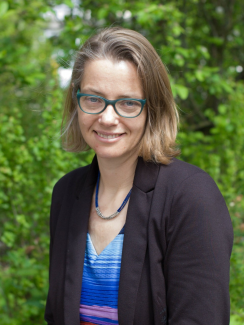Event
How to tango with four: Meiotic adaptation to whole genome duplication
Seminar with Dr. Kristen Bomblies

Whole genome duplication (WGD) doubles the chromosome content of cells, and when inherited, leads to the formation of polyploid organisms. Polyploids often have novel traits and strong stress resilience, and occur throughout the eukaryotic tree of life. However, when the genome first duplicates, neopolyploids face serious challenges to reliable chromosome segregation – and thus fertility - in meiosis. Since there are many fertile polyploids found in nature, we know it is possible for evolution to overcome these challenges. To understand how regular chromosome segregation can evolve from such inauspicious beginnings, we use as our model system Arabidopsis arenosa, an outcrossing relative of A. thaliana with extant diploid and autotetraploid populations. Autotetraploid A. arenosa has cytologically diploidized meiosis, while newly generated tetraploids have many aberrations in meiosis, including problems with chromosome pairing and synapsis. We have shown from whole genome resequencing and scans for selection that a subset of genes encoding meiosis proteins show strong evidence of selection in the tetraploid lineage, particularly cohesins and interacting partners, and proteins that build the axes and synaptonemal complex. We have begun functional follow-up on several genes, focusing initially on the axis proteins. We show that the derived alleles of the axis proteins affect polyploid meiosis in ways that promote chromosome segregation in the polyploid context. We hypothesize that these genes together represent a co-evolved polygenic solution to WGD-associated chromosome segregation challenges, and we show that the tetraploid solution is also adaptive in a higher ploidy context.
Join Zoom Here
https://biol.ethz.ch/en/the-department/people/person-detail.MjU1Mzkz.TGlzdC80NjAsOTIzMDMxMjIy.html
